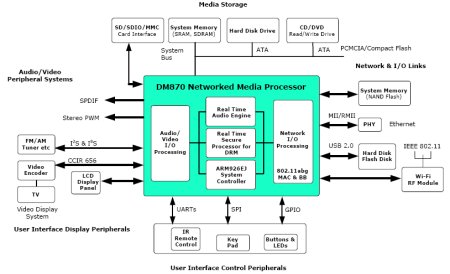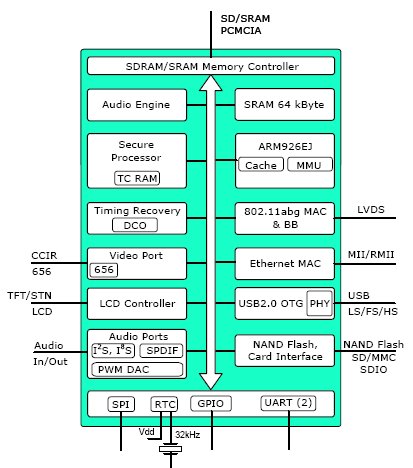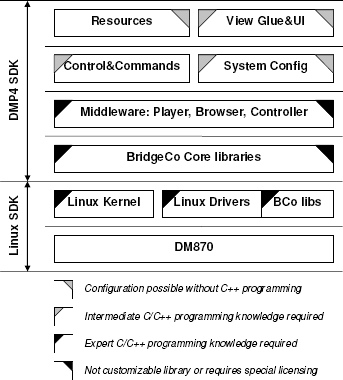Low-cost Linux-based design network-enables stereo components
Jan 8, 2008 — by Eric Brown — from the LinuxDevices Archive — 110 views A Swiss vendor of digital media player (DMP) hardware-software reference designs has switched to Linux. BridgeCo's third-generation “JukeBlox” design is based on a custom ARM9 SoC, and has already been adopted by several major AVR (audio-visual receiver) and table radio vendors, the company claims.
A Swiss vendor of digital media player (DMP) hardware-software reference designs has switched to Linux. BridgeCo's third-generation “JukeBlox” design is based on a custom ARM9 SoC, and has already been adopted by several major AVR (audio-visual receiver) and table radio vendors, the company claims.
digg this story |
Founded in 2000, and based in Zurich, Switzerland, BridgeCo supplies chips and reference designs for both DMPs and Firewire/USB-connected professional audio soundcards (MAudio is a customer, the company boasts). Its first two generations of DMP designs used a proprietary RTOS (real-time operating system) called Knos, and derived from ThreadX.
Now, BridgeCo has decided to switch to Linux. It calls its third-generation “JukeBlox” design the “first Linux SDK” in the market for DMP reference designs. The SDK is currently being finalized, for release this spring, according to Director of Marketing Fred Valenzuela.
The decision to “go Linux” has apparently been well-received, with well-known consumer audiophile equipment manufacturers Harmon Kardon and Klipsch both pledging to use the new BridgeCo chip and Linux-based software stack in forthcoming products.
In addition to higher-end stereo and home-theater receivers (AVRs), the JukeBlox design suits table radios, iPod docks, and other inexpensive devices, BridgeCo claims. The design is available in “ready-to-manufacture” form, and boasts a BOM (bill of materials) 20 percent lower than previous BridgeCo DMP designs based on proprietary OSes, the company says.

JukeBlox “typical application” diagram
(Click to enlarge)
The chip
BridgeCo's third-generation DM870 SoC (system-on-chip) DMP processor has a “triple-core” architecture, according to the company. There's a 240MHz ARM926EJ core on which Linux runs. There's also a dedicated security processor of a proprietary nature running at 160MHz, and optimized for 1024-bit and greater encryption techniques, including DTCP (digital content transmission protection) and other DRM (digital rights management) schemes as well as good old fashioned RSA. Finally, there's a DSP-like “Audio Engine” core said to support SIMD (single-instruction, multiple data) for high efficiency, and to deliver 600 MIPS (millions of instructions per second).

BridgeCo's DM870 SoC function block diagram
The DM870 also integrates 64KB of SRAM, along with external NAND and SDRAM memory controllers. There's also a QVGA (320×240) LCD controller, rich complement of audio interfaces, and a plethora of consumer electronics and PC-style on-chip peripheral interfaces, including wired and wireless Ethernet, USB 2.0 OTG (on-the-go), GPIO, SPI, a pair of UARTs, and a real-time clock (RTC).
The DM870 is offered in a 292-pin mBGA package measuring 17mm square, and priced at about $14 in bulk. Clearly, every stereo component with an amplifier will soon have built-in DMP capabilities.
The Linux stack
The JukeBlox stack and SDK is meant for developing C++ streaming audio applications that run on top of Linux, which runs in turn on the DM830 SoC. The SDK is meant for use on Linux-based development hosts (Fedora Core 5 and Core 6 are officially supported).
The SDK is currently based on a 2.6.24 Linux kernel. It includes Linux drivers for the DM830's crypto engine and other hardware and peripherals. There's also an available icon-based GUI based on a “partner-developed graphics engine called Paravent,” Valenzuela said. “[Paravent] is XML-based and very simple. It uses the model-view-control [MVC] approach and is quite flexible and adequate for our needs.”

BridgeCo Linux SDK components
An available graphics stack built on Paravent supports an icon-based user interface developed with lots of focus group input, the company says. The interface offers “complete” metadata, including Album cover art, while offering “Favorites” and other song tagging, track purchasing capabilities through Rhapsody, “personal” radio station creation through Pandora, and other whizzy features, according to BridgeCo.
As is typical of Linux stacks, there are lots of codec options to choose from, including MP3, WMA and WMA lossless, and AAC, among others. There's also middleware for compliance with standards from UPnP (universal plug-and-play, aka Bonjour) and the DLNA (Digital Living Network Alliance), both of which are aimed at enabling seamless discovery, indexing, and rendering of network-based media assets. Supported streaming protocols include HTTP, Shoutcast, WMS/MMS, RTSP/TCP, and LineIn.
Additional touted features include:
- Full function Sample Applications
- Local Color LCD
- Internet radio with OEM-branded portal
- Easy UI customizations
- Color album art
- Rhapsody DNA
- Digital media player/adaptor
- JPEG photo shows
- Pandora
- Alarm clock
- USB 2.0
- DRM capable
- AM/FM/RDS Tuner
- Wi-Fi / Ethernet
- UPNP compliant
- Linux 2.6 based SDK
- DLNA compliant
Proven support for complex standards and protocols is certainly among the reasons manufacturers might find Linux appealing, along with the component cost competitiveness engendered by a multitude of tested device drivers. Stated BridgeCo CEO Gene Sheridan, “Our new Linux SDK and build-ready reference design allows OEMs to rapidly design and market unique software-customized systems that are thoroughly verified and proven.”
Stated Gina Harman, president of Harman Consumer Group, “The new SDK and comprehensive firmware bundle allows us to customize BridgeCo's modular software stack to quickly develop products that are uniquely optimized for specific market segments.”
Another mark in Linux's favor is the collaborative economics engendered by its licensing model. BridgeCo has started a JukeBlox Design Partners program with the aim of enabling partners to “enhance the middleware functionality” of the Linux-based stack. The first three partners include Compal Electronics, a Taiwan-based ODM (original design manufacturer) and CM (contract manufacturer); Attero Tech of Fort Wayne, Indiana, which develops iPod interfaces and docking products, A/V systems and other consumer electronics systems; and Austria-based StreamUnlimited, which develops audio streaming, wireless, and user interface designs.
Availability
The JukeBlox development platform, including hardware reference platform and SDK, will be available in Q1 or Q208 for $10,000, says BridgeCo. The DM870 is sold bundled with the JukeBlox firmware for $14 each in 1,000 unit volumes. Samples are available in Q108, with mass production scheduled for Q208.
This article was originally published on LinuxDevices.com and has been donated to the open source community by QuinStreet Inc. Please visit LinuxToday.com for up-to-date news and articles about Linux and open source.